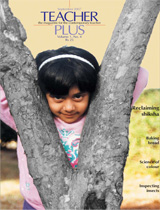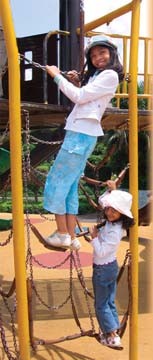Manish Jain
 “Real democracy is not about being able to choose one’s rulers. Real democracy starts with being able to choose one’s teachers.” – Dayal Chand Soni (adapted from Mewari language)
“Real democracy is not about being able to choose one’s rulers. Real democracy starts with being able to choose one’s teachers.” – Dayal Chand Soni (adapted from Mewari language)
My family and I have made a decision not to send our daughter to school, either in India or abroad. Instead, Kanku (age 5) and we are learning together. As teachers working within the education system, you may be wondering why we took such a decision and how we are supporting our daughter’s learning. In this short essay, I will try to share some of the reasons behind our decision and the very practical actions we are taking to support Kanku in choosing her own gurus and weaving her own learning web.
 What’s wrong with schooling?
What’s wrong with schooling?
We made our decision before Kanku was even born. For years, I had been working in the field of international education, and I had come to understand some very disturbing things about schooling. Of course, there are the oft-heard complaints: irrelevance, too much pressure on children, heavy bags, overloaded curriculum, corporal punishment, too many tuitions, etc. But, I had been looking deeper than these usual official suspects into the hidden curriculum of schooling. I saw that what school fundamentally does is disconnect us – from nature, from physical work, from our hands, from our families and communities, from our local languages, from our wisdom, and from real world issues. In sucking away children’s time, forcing them to regurgitate decontextualised information, and keeping them trapped in a box all day, schools kill their sensitivity, innate propensity for cooperation, multiple intelligences, spontaneous curiosity and imagination. They create fragmented and hypocritical minds – people who are unable to see beyond black and white disciplinary categories and roles; people who cannot relate their selfproclaimed beliefs and values with their actions; people who fear experimenting with the unknown.1 In other words, the perfect modern babus. Schooling – with its precise system of sorting, ranking and labelling children has created a modern social hierarchy that is far worse than the caste system. So much to the point, that people who do not know how to read or write or who have not gone to school are treated with contempt and made to feel invisible. Their children who attend school for the first time are obnoxiously labeled ‘first generation learners’; thus, negating all the learning that they and their ancestors have been engaged in for thousands of years. Such is the arrogance of today’s educationists.
Why would such horrible things be done to innocent children? Is it an accident? When I started to look at the origins of the modern schooling system, I saw how it was deeply connected to the modern nationstate, industrial economy, and militarisation (and here, in India, to colonial rule).2 It suddenly made sense to me. This school system made good workers, good soldiers, good citizens who would be obedient to the state-market nexus. John Taylor Gatto has described the purpose of schooling as ‘dumbing us down’. Students learn not to question authority. In fact, they learn to have a dogmatic faith only in experts, technology and government policies to solve their problems. In this way, schooling today also produces good consumers – people who rely on readymade answers and solutions and who work to earn money to purchase them. After all, if one loses the capacity to work with one’s hands and to build non-commodified relationships, then one becomes totally dependent on the global market. It became clear to me that schooling has no serious interest in ever having students really develop critical thinking capacities or become more creative or loving because if the students did this, then this global political-economy would actually collapse from a lack of stupid consumers.
Perhaps the worst thing that schooling does is to force everyone on one path, one measure of success, one style of intelligence, one way to learn, and one vision of civilisation. Schools were undermining the fundamental truth and evolutionary resource of humanity: its diversity. As with other creatures of nature, we are most healthy and stable when we are diverse and self-organising. The more monolithic, more monocultural we become, the more endangered we become as a species.
But what about education reform?
Of course, having worked in the field of education in many countries and contexts around the world, and having gone to school myself, I knew all the counter-arguments. You need schools because without them children will run wild. There will be chaos. How will we have unity? Or proper socialisation? How will children learn without schools? How can there be equality in society without schools? I was told time and again that the solution was education reform. But I grew up in the USA, where I saw billions of dollars being put into fixing schools, approximately an average of US $ 9000 (or roughly Rs 3,60,000) being spent per child per year, with the latest technology, teacher training, textbooks, etc., introduced every year. And still, the vast majority of children and families are suffering with a plethora of deep and debilitative psychological, spiritual, physical and intellectual problems. Most educationists there acknowledge that their education system is in a mess. It is difficult to see how India with its government spending roughly Rs.3000 per child per year could ever think of fixing what is essentially the same broken Western education model. At the same time, we need to learn from the experiences of the West and challenge the institutional myth that the problems facing education can be solved by simply throwing more money at them. I believe that it is time for us to stop mimicking the Western models and methodologies and to take up the challenge of creating our own models and approaches for individual and community learning.

I was also familiar with various commissions in India making recommendations for education reform over the past 60 years. Almost 15 years ago, the Yashpal Committee Report astutely noted that there is a lot of teaching and training taking place in the country but very little learning and understanding. But yet, if you asked teachers, children, and families, how they compared today’s system with the past, they all agree that the situation has worsened. People like Azim Premji of Wipro are talking about creativity and free thinking in education, but their solutions depend on fancy computers and software, high-end teacher training programs, textbooks, etc. Obviously, this approach makes sense if you want to create new markets for your computer business or be a major player with nine per cent growth in the global economy, but it hardly makes sense for a healthy future for our children and local communities. He and his ilk are yet to understand the tremendous creativity that forms the soul of local communities – what I call the ‘jugaad mind’. This way of engaging with the world emerges not from interacting with virtual trees and forests but through deep sensing with real nature and active, authentic engagement with hands.
So-called ‘alternative schools’ have not proven themselves capable of reforming factory-schooling anywhere in the world. They are dangerous because they provide the illusion that school-jails can someday be fixed for all. They may respond to some of the superficial criticisms like less exams and homework or utilise pseudo-democratic decisionmaking processes or include some more progressive content and teaching methodologies, but they don’t address the roots of the hidden curriculum of schooling: the consumerism of knowledge, the soulnumbing obedience to the state-market institutions, the deep fragmentation of holistic ways of knowing and being in the world, the unjust socio-economic hierarchy and culture of mistrust, the destruction of diverse local knowledge systems. A friend likes to remind me that if factory-schools are like zoos, then alternative schools are like sanctuaries – only they follow the Cambridge Board or the IB Board. At the end of the day, the game remains the same. Most graduates do not develop the confidence that they can create their own learning webs without lifelong institutional direction. They are not able to imagine possibilities for meaningful living beyond fitting into the global economy. Most graduates are unable to re-connect with and build healthy and sustainable local communities. I would argue that those few who are able to do these things – whether from government, convent, private or alternative schools – do so in spite of their school education, rather than because of it. Furthermore, alternative schools have yet to take a strong stance against the criminal activities committed daily by schools, especially the labelling of millions of innocent children as ‘failures’. No child is born a ‘failure’, it is the teachers and schools that make them so. One has to wonder about the moral backbone of the educational establishment (locally and globally) if they can continue to allow this heinous crime to be committed without even raising a voice.
I have tried to learn from past thinkers in education. Many great leaders have tried to reform the current system and have failed. You and I are in no way as influential as Gandhi, Tagore, Krishnamurti, Vinoba Bhave, Gijubhai, Sri Aurobindo, John Dewey, John Holt, Paulo Freire, etc. were. We need to understand why they were not able to make a real dent – in fact, the education system has gotten much worse after them with more exams, more tuitions, more pressure, more ‘failures’. A friend of mine often reminds me that, “Adding wings to caterpillars does not create butterflies. It only creates more awkward and dysfunctional caterpillars.” How long should we continue to tinker at the edges of a rotten and corrupt system?

Many of these great thinkers eventually came to the same conclusion in their lives that I have. First, to change the education system, we have to be willing to challenge the modern, military-industrial way of life, and its path/indicators of success and progress. Basically, we need to shift our still-colonized mental models and philosophical reference points. This includes raising fundamental questions about the dominant frameworks of science, nationalism and economic development – something that our friends in NCERT or alternative schools are unwilling to do. Second, we also need to focus our attention on what it means to build nurturing community and sociospiritual ecologies. We need to seriously think about pursuing other ways of living and relating (outside of the rules of the commodified rat-race), which are more balanced, healthy, caring, socially just and spiritually meaningful. I have seen that subtle but conscious shifts in our personal lifestyle choices can begin to help us imagine, uncover and co-create the spaces, processes and community relationships we need for pursuing deep lifelong co-learning. A good place to start is to learn from people who have not gone to school. And finally, institutions are not going to change by themselves; it is individuals and communities that must take the lead in creating alternatives for themselves. The more alternatives that can be co-created, the more possibilities for the emergence of new systems of influence.
What’s the alternative?
Because of the failure of education in the US, over three million people there have taken the decision to not send their children to school. They believe that as parents and communities, they are better equipped than the State and its institutions to support the learning and growth of their children. They are part of what’s broadly termed the ‘homeschooling movement’. One of the most exciting aspects of this movement is that they are connecting with a large network of informal clubs and citizens’ associations in order to support their children’s varied interests and desire for social interaction. These range from astronomy clubs to football associations to nature camps to community service groups. They are oftentimes organized by the children themselves or by a small cluster of families. Homeschoolers have also generated a wealth of learning resources that are shared on the internet.
Homeschooling, however, is by no means a homogenous movement. In the past, it has been confused with Christian fundamentalist groups or white elites. In reality, a very wide spectrum of philosophy and practice exists among this movement. On one end, are people who are trying to reproduce school at home. Parents act as schoolteachers; the children go through official urriculum and textbooks, have set schedules and take various exams to achieve school equivalency.
Several parents, however, resist the entire framework of schooling and its rules and parameters. They do not want to reproduce school at home and instead are trying to support their children’s varied learning interests and natural curiosity. This spectrum of the movement is called ‘unschooling’. They see learning as a natural, joyful process, and they don’t want to interfere with that or sabotage it. They believe that children are good judges of what they are ready to learn and when they are ready to learn it. Learning processes should therefore be ‘child-led’ rather than simply just child-centered. This implies that there is no set curriculum, no imposed teachers, no schedule, no textbooks, no exams, no fixed models. Rather, children explore their own questions, at their own pace, and engage with a number of different spaces, people and relationships in their community. Unschoolers believe that it is not enough to take the children out of schools, we must remove schooling from deep within ourselves. This means questioning conditioning such as comparing children against each other or looking at knowledge through the lens of compartmentalised subjects.

We at Shikshantar have tried to broaden the framework of ‘unschooling’ and have shared the concept and practice of Families Learning Together. The idea is that parents, children, neighbors, relatives, friends – and all those we consider as part of our ‘joint/extended family – are each responsible for their own learning and are responsible for supporting and nurturing each other in our varied learning interests. We believe that children need to re-ignite passion and curiosity in adults and adults need to do the same for children. The catch is that adults can only do so if they fully embrace and embody the spirit of continuous ‘unlearning’ and ‘uplearning’. The real problem is not with the children, it is with our adult conditioned and corrupted minds. So we, as adults, need to be willing to change if we want to reclaim shiksha into our lives and into our children’s lives. Each of us can generate our own ‘intergenerational learning webs’ – an intricate set of multi-age relationships across different spaces where each of us (adults as well as children) can go to learn or unlearn what we want. For example, the city farmer’s plot of land, the shoemaker’s shop, the artist’s studio and gallery, the local temple, church or mosque, our friends’ homes, the cows and goats on the side of the road, the lake for a swim, etc. This diversity of interactions across ages, spaces, media forms, economic classes, castes, etc., leads to real human socialization and to deep wisdom. This is real shiksha. And every one of us has the power to decide what we want to learn, who we want to include when making our own learning webs and, in the process, creating our own particular system of shiksha. For me, one billion people in India means that we must have at least one billion systems of shiksha. Are we bold enough to reimagine such a vision?
In the 1970s, Ivan Illich proposed the idea of ‘deschooling’ which in India, has been badly misunderstood as simply just shutting down all the schools. Deschooling can be described as ‘deinstitutionalising ourselves’, ‘de-programming ourselves’, ‘de-professionalising ourselves’, etc., in order to counter modern forms of dehumanization. Illich describes this dehumanization as the reduction of human beings into homo economicus. This process of deschooling involves asking larger questions about education itself and its relation to the state, the market, the mass media, the military, the scientific establishment and the project of modernity. Illich also proposes a different definition of modern education which requires deeper consideration, “I came to define Education as learning under the assumption of scarcity, learning under the assumption that the means for acquiring something called knowledge are scarce.” In other words, under modern education, knowledge becomes a commodity that can only be obtained through schools (or some organised institutional program) rather than a natural aspect of being in the world. People are trained/forced to believe that learning and the growth of cognitive capacities requires a process of consumption of services presented in an industrial, a planned, and a professional form. This debilitating dependence created by modern education helps pave the way to a life-long dependence on other service monopolies, such as hospitals, courts and police, to organize our lives.
With regards to deschooling, Illich is asking us to think deeply about the idea of counter-productivity of modern institutions and tools which are being propagated in society; that is, how something that may have started out as a beneficial or useful process can grow into something harmful or destructive. For example, the introduction of so many modern time-saving devices has actually taken away our time for doing things that are really meaningful to us. Illich described, “A tool can grow out of man’s control, first to become his master and finally to become his executioner… There are two ranges in the growth of tools: the range within which they are used to extend human capability, and the range in which they are used to contract, eliminate, or replace human functions.” Illich is asking us to consider the possibility that schooling has grown out of our control and has become our master. He is warning us that it could someday become our executioner.
There is also a very constructive and creative aspect to deschooling which needs to be highlighted. Illich was really interested in the creation of convivial social formations, rather than centralized manipulative institutions telling people how to live their lives. Conviviality involves autonomous, caring and organic intercourse among persons, and the wise and interdependent intercourse of persons with their natural and social environment. Such a vision asks us to think deeply about what constitutes healthy living communities in India? Are our efforts supporting the regeneration of healthy and resilient communities and cultures? The vision of conviviality calls for us to explore how to authentically reclaim control over our own lives – our food, our health, our waste, our clothing, our buildings, our media, our self-governance, etc. – away from the readymade world of big institutions and back into our own hands. Conviviality is predicated on dynamic and natural processes of self-organised learning, colearning and unlearning.
The question remains as to whether we still have the courage, wisdom and imagination left to move beyond business as usual and enter into a process of asking disturbing questions about our own education and the education system.
References
1 Read more on the Aspects of the Culture of Schooling at www.swaraj.org/shikshantar/resisting.html
2 Reference John Taylor Gatto, The Underground History of Education. Also see www.johntaylorgatto.com
3 Some interesting sites include:
http://homeschooling.gomilpitas.com/index.htm
http://learninfreedom.org, http://sandradodd.com
http://www.homeschoolzone.com
4 www.swaraj.org/shikshantar/familieslearningtogether.htm
